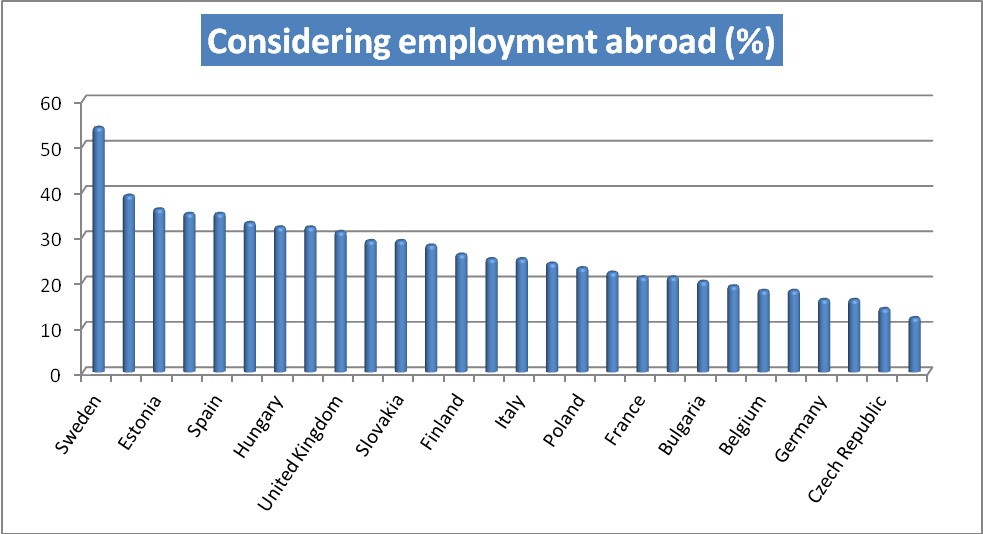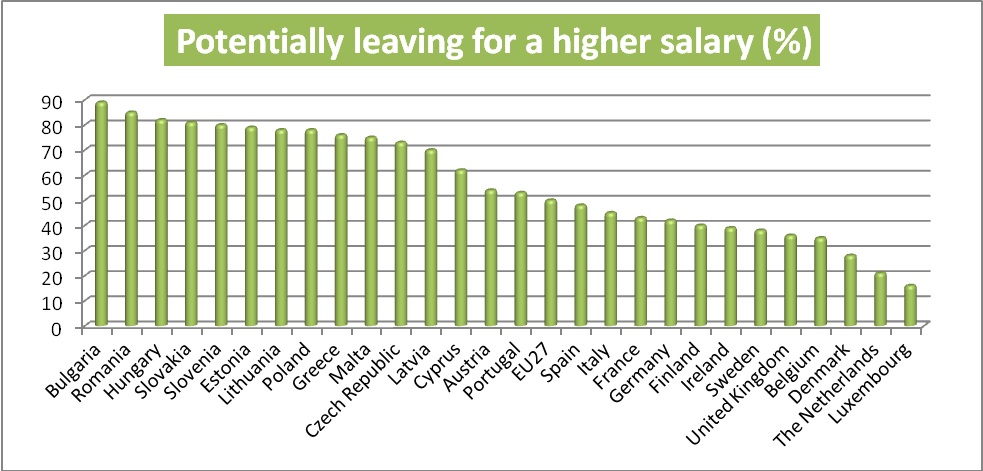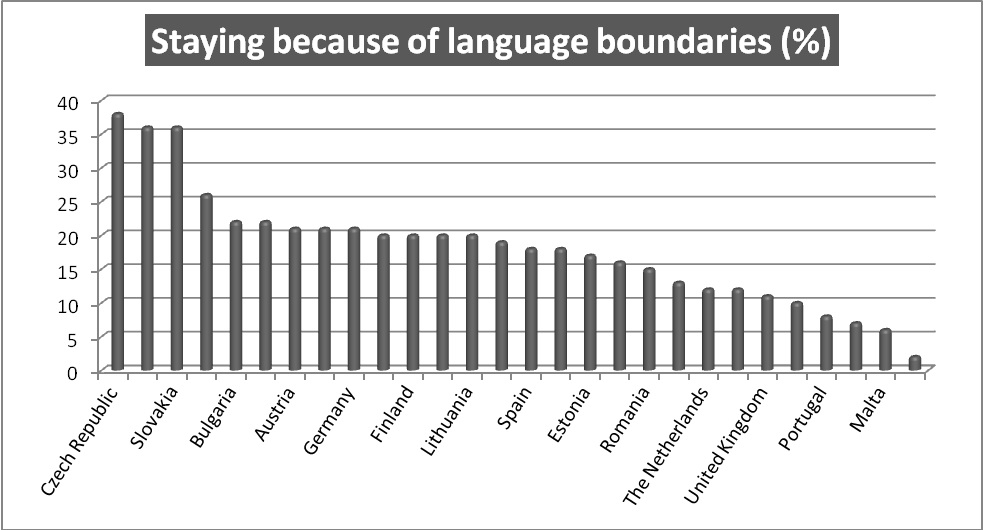One in every four EU citizens would either probably or definitely leave their home country to work in another EU member state in the next ten years. The statistics are led by Sweden (52%); whereas, Austria, where only 12% altogether claimed that they would leave their home country to work elsewhere in the EU, closes the ranking table. It is closely followed by the Czech Republic (14%), Germany (16%) and Luxembourg (16%).
Thus, working abroad appears to be a natural phenomenon in the case of Scandinavian or Baltic countries. One third of Hungarians consider working in another member state in the next ten years: in our closest, regional environment our statistics can be seen as relatively high. In this regard, it is interesting that countries from our region can be found at the top, and also at the bottom, of the list. Slovenians (20%) and Estonians (14%) aim to work abroad the most, meanwhile most Czechs (4%) and Austrians (2%) want to stay at home. This percentage is remarkably high among Croatians in the Central-East European region (21%), which also shows the necessity of the Croatian membership.
50% of all EU citizens considering working abroad say they would do so because of higher salaries; however, there is a difference between the EU15 countries and the 12 New Member States regarding this reason. As for the former, only 45% of potential workers would go abroad for a better salary; whereas, in NMS12 countries, 80% of citizens would consider leaving for the same reason. As a consequence, it seems to be a fact that better salary bears the highest significance in most of the Central-European and Baltic countries. Therefore, the most important motivational factor is money: only Romania (85%) and Bulgaria (89%) come before Hungary (80%). Another important reason chosen by Hungarian respondents, and resulting in higher ranking positions, was better working conditions: 40% of Hungarians referred to this factor as the most important reason, as opposed to the 22% average of the rest of EU27 states. Furthermore, only Greece and Cyprus ranked higher than Hungary. From this, we can deduce that unpleasant working conditions, in contrast to better payment, cannot be seen as a phenomenon typical of the Central-European states. Thus, it is the uniqueness of the Hungarian conditions that higher salary and better working conditions both play an important role in people’s desire to leave. However, in our regional environment, there is a tendency for large numbers of workers to leave their homeland in the hope of a better living, unlike Luxembourg, where the number of workers planning to leave their country is the lowest (16%), which can mean that salaries there are the most favourable. It is also important to mention another reason for leaving: 20% of Hungarians and 17% of Slovenians plan to leave their homeland for better taxation, meanwhile only 1% of the citizens of Bulgaria and Estonia care about taxing. Greeks also chose an important factor: 40% of them hope for better social conditions, unlike the citizens of Luxembourg, where only 1% would leave because of social guarantees.
The difficulties in finding a job in the home country also proved to play a significant role among the reasons. 63% of Cypriots would leave being unable to find a job in their home country, which leaves Cyprus at the top of the statistics with an outstanding percentage compared to the rest of the EU countries. It is followed by Greece and Portugal with “only” 43% and 41%, respectively. Furthermore, there is Denmark with noticeable 59% of its citizens saying they would leave even for a state with similar (and not much better) economic conditions. Regarding Hungary, the survey shows that unemployment is far from being a distinctive factor: only 28-29% (the summarized average of all EU states) chose to leave because finding a job seems to be easier abroad. The reason for Hungarians to seek work abroad seems to be the fact they are not able to find a job that satisfies their needs as for both a higher salary and a better working environment. There is another important factor of working abroad, i.e. the opportunity for professional improvement. In this regard, Austrians need the possibility of professional development the most.
Last but not least, it is important to mention those respondents who would probably or definitely not leave their home countries (17% and 54% of all respondents, respectively). There are several reasons playing a part in their decision; however, the most significant factor for 47% of them is personal or family reasons. Denmark, Austria and Cyprus lead the statistics with each showing 65%. Latvians (49%) and the citizens of Estonia (40%) also keep in mind personal and family reasons. A further 32% would stay simply because they do not wish to live or work abroad: here Cyprus, again, leads the list with 61%. For Hungarians, the most hindering factor proves to be the lack of knowledge of a second language. 36% of Hungarian respondents chose this to be their main reason for staying. Besides Hungary, this percentage (which is nearly the double of the 20% EU average) is only shown by Slovakia and the Czech Republic. In this respect, the Nordic and the north-western countries are the counterweight here. In these countries, people who stay because of language boundaries are the fewest.






